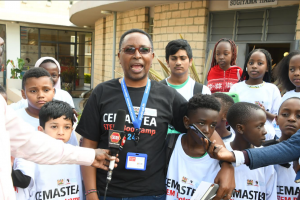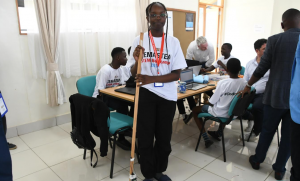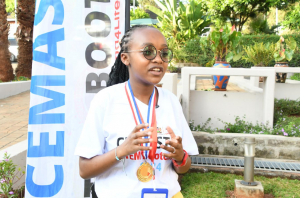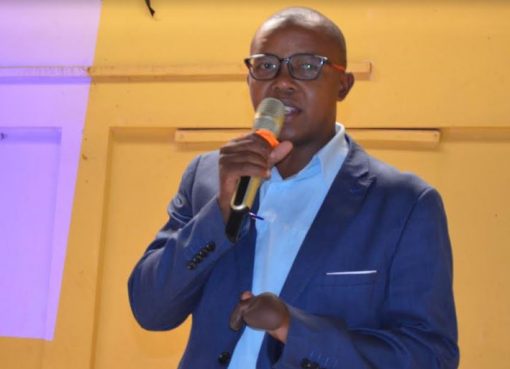The 6th CEMASTEA STEM Boot Camp wrapped up after a weeklong of immersive, hands-on learning and innovation at the Centre for Mathematics, Science, and Technology Education in Africa (CEMASTEA), with a powerful call to students to pursue Science, Technology, Engineering, and Mathematics (STEM).
Speaking to the media at the institution in Karen, Nairobi, Martin Mungai, Deputy Coordinator for STEM, stated that the Boot Camp is designed to ignite interest among learners in key technology areas, particularly robotics, creative coding, mobile app development, and 3D/graphic design.

He added, “The learners also engage in Arduino prototyping, where they create coding, set up mechatronics systems, and develop simple projects designed to address real problems in the society.”
In line with the curriculum design that integrates coding into education, Mungai divulged that CEMASTEA is committed to fostering continued interest in STEM among learners.
He said that the Government, through the Ministry of Education, has been at the forefront in promoting digital literacy through the Digital Literacy Programme (DLP) in schools where learners are encouraged to be innovative, engage in research projects, and develop solutions to the societal challenges. Through the effort, the initiative has been complementing the efforts of CEMASTEA in advancing STEM education.
He said, “The Boot Camp, which ran from December 2nd to 6th, had 72 participants from various fields,”.
Mungai revealed that learners used a thinking tool, SCAMPER (Substitute, Combine, Adapt, Modify, put to another use, Eliminate, and Reverse), to come up with projects which can solve human problems.
Emmanuel Tito, a Grade 8 student from The Pearls Academy, and Nadya Nyevu, a Form Two student from Kenya High School, are leading a team to develop a Smart white Cane for individuals with visual impairments.

The Smart Cane, which is rechargeable and uses ultrasonic sensors, detects barriers up to 60 cm away as users walk, guiding visually impaired individuals, improving their mobility, and helping them avoid potential dangers.
Tito says, “The reason for developing this Smart White Cane is to help visually impaired individuals lead normal lives. When the stick detects danger, it emits an alarming sound, alerting the user of potential dangers. This not only helps save lives but also makes it easier for those assisting them to manage other tasks,”.
Yash Asher, a Form One student from Samaj School, is working on a Smart Agriculture project, which is aimed at addressing challenges faced by many farmers, including resource wastage, water conservation, and labour management.
He hopes his project can assist millions of farmers by automating Smart Irrigation Systems that allow them to monitor in real time temperature and soil moisture, enabling farmers to adjust water flow as needed.
The system can also detect issues like water shortages and send alerts. Besides water and temperature management, the system can also control lighting to optimize photosynthesis and help determine the ideal time for harvesting. “By installing sensors in greenhouses to monitor soil moisture and temperature, farmers can optimise irrigation, ensuring crops receive the right amount of water,” Asher explained.
In a bid to tackle health challenges in Kenya, Kibe Elsie Njeri, a Form 4 student from Maryhill Girls High School, along with her team, developed a mobile App called Mediconnect to help patients connect with specialists.

According to Njeri, the App provides a platform for patients to easily select specialists, saving both time and money by minimising the lengthy hospital registration process.
She said, “The main goal of the app is to assist patients who struggle to access specialised care and to also help reduce the incidences of fake doctors and corruption in healthcare systems. The app operates 24/7, providing contact information and details for various specialists, ensuring patients can access care at any time,”.
Another project is Expose 360; an App designed to help individuals report corruption cases anonymously to authorities. The App allows users to submit reports and evidence, and if implemented, the team says it has the potential to significantly aid in curbing corruption.
Ethan Weru, a Grade 7 pupil from Green Garden School, is leading his team in developing Robotic Grabber, a device designed to safely grab, move, and dispose of harmful substances that could pose a threat to human safety. According to Weru, Grabber can be used to handle dangerous chemicals, equipment in hospitals and labs, or even in crime scenes where bombs, grenades, or weapons need to be safely disposed of.
Other standout projects included the Smart Dustbin, a Colour Sorter designed to help visually impaired individuals identify different colours; the Agricare App that connects farmers with essential inputs and equipment; and the Funtown App, a marketing tool that links house sellers with potential buyers. Additionally, the Ecotrack App, aimed at managing garbage production and promoting a cleaner environment by addressing illegal dumping, also garnered significant attention.
All participants were awarded certificates after completing the training, with the top three in every group receiving medals for their outstanding performance.
Mungai is encouraging more students to participate in the training exercise.
By Ian Chepkuto



